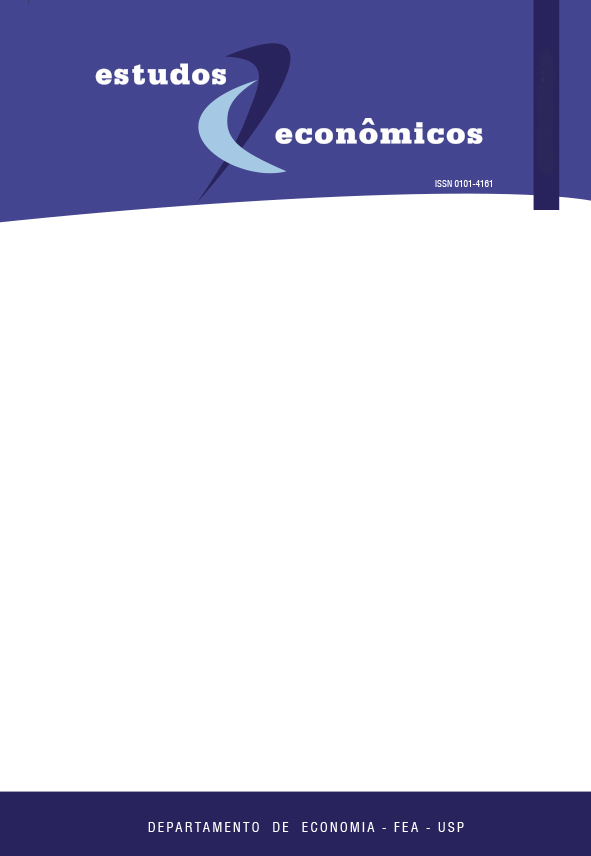Clássicos versus Keynes: a abordagem formal de David Champernowne
DOI:
https://doi.org/10.1590/S0101-41612012000100007Keywords:
aggregative models, causality, recursive systems, Champernowne, KeynesAbstract
This paper aims at emphasizing a feature that has been somewhat neglected by studies dealing with the formalization of John Maynard Keynes's General Theory of Employment, Interest and Money (1936). Specifically, this paper stresses the formalization strategy David G. Champernowne applied in his essay "Unemployment, Basic and Monetary: the classical analysis and the Keynesian", published in 1935-36 in the Review of Economic Studies. We underline the fact that he distinguishes the Classical Analysis from the Keynesian not only by means of the different assumptions underlying each theory but mainly through the construction of sub-systems based on a general system, with distinctive recursive features (causal relations). His literary explanations, the algebraic descriptions of the behavioral functions and of the equilibrium conditions and his diagrammatical illustrations as well as the choice of specific groups of variables to stand for each of these theories (and variants) are features of this Champernowne's essay that deserve a more attentive assessment.
Downloads
References
Boianovsky, M. (2005) Some Cambridge reactions to ‘The General Theory’: David Champernowne and Joan Robinson on full employment. Cambridge Journal of Economics, vol. 29, n. 1, pp. 73-98.
Champernowne, D. G. (1935-36) Unemployment, Basic and Monetary: the classical analysis and the keynesian. Review of Economic Studies, vol. 3, pp. 201-216.
Cowell, F.A. (1987) Champernowne, David Gawen (born 1912). Eatwell, John et al. (eds)(1987): The New Palgrave: A Dictionary of Economics. vol. I, pp. 401. London: Macmillan.
DarityJr., W. A. e Young, W. (1995) IS-LM: An Inquest. History of Political Economy vol. 27, no. 1, pp. 1-41.
Dimand, R. (2000) Macroeconomics without IS-LM: a Counterfactual. In.: Young, W. & Zilberfarb, B. Z. IS-LM and Modern Macroeconomics. Boston: Kluwer Academic Publishers, pp. 121-131.
Harcourt, G.C. (2001) David Gawen Champernowne, 1912-2000: in appreciation. Cambridge Journal of Economics, vol.25, pp.439-442.
Harris, S. E. (ed) (1947) The New Economics: Keynes’s influence on theory and public policy. London: Dennis Dobson., New York: Knopf, 1965 edition.
Harrod, R. F. (1937) Mr. Keynes and traditional theory. Econometrica, vol. 5, pp. 74–86.
Heller, C. (2007) Hicks, A Teoria Geral e a Teoria Geral Generalizada. Revista EconomiA, vol. 8, no. 3, pp. 401-436.
Hicks, J. R. (1937) Mr. Keynes and the ‘classics’: A suggested interpretation. Econometrica, vol. 5, pp. 147-159.
Meade, J. E. (1937) A simplified model of Mr. Keynes’ system. Review of Economic Studies, vol. 4, pp. 98-107
Moggridge, D. E. (1992) Maynard Keynes: An Economist´s Biography. London: Routledge.
Pesaran, M. H. (2001) Address given by M. Hashem Pesaran at the Memorial Service for Professor David Gawen Champernowne, 1912-2000, held at Trinity College on 17 February 2001. (the full text of the address has been published in “Trinity College Annual Record”, Cambridge University Press, 2001).
Reddaway, W. B. (1936) The General Theory of Employment, Interest and Money. Economic Record, vol. 12, pp. 28–36.
Rymes, T. K. (1989) Keynes’ Lectures, 1932-35: Notes of a Representative Student: A Synthesis of Lecture Notes Taken by Students at Keynes’ Lectures in the 1930s Leading Up to the Publication of The General Theory. The University of MichiganPress, Ann Arbor.
Skidelsky, R. (1992) John Maynard Keynes - the economist as a saviour - 1920-1937, London, Macmillan
Skidelsky, R. (1997) Keynes. In: Raphael, D. D.; Winch, Donald & Skidelsky, Robert (1997) Three Great Economists. Oxford University Press, pp. 219-372.
Young, Warren (1987) Interpreting Keynes: The IS/LM Enigma, Boulder, Colorado: Westview Press; Oxford: Basil Blackwell.
Downloads
Published
Issue
Section
License
Copyright (c) 2012 Cláudia Heller, Jaylson Jair da Silveira

This work is licensed under a Creative Commons Attribution-NonCommercial 4.0 International License.
By submitting an article, the author authorizes its publication and attests that it has not been submitted to any other journal. The original article is considered final. Articles selected for publication are proofread for grammatical and orthographic errors. The journal does not pay rights for published articles. The Institute of Economic Research from the School of Economics, Business and Accounting of the University of São Paulo (Instituto de Pesquisas Econômicas da Faculdade de Economia, Administração e Contabilidade da Universidade de São Paulo) owns the journal's copyright.




